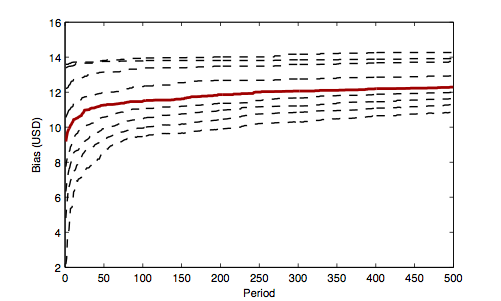Dynamic Selection and Distributional Bounds on Search Costs in Dynamic Unit-Demand Models
Jason R. Blevins and Garrett T. Senney.
Quantitative Economics 10 (2019), 891–929.

Versions and Availability:
- Published version (DOI: 10.3982/QE728)
- Preprint version (August 30, 2018)
- Ohio State University Working Paper 14–02, 2014: IDEAS | EconPapers | SSRN | ResearchGate
Abstract. This paper develops a dynamic model of consumer search that, despite placing very little structure on the dynamic problem faced by consumers, allows us to exploit intertemporal variation in price distributions to estimate the distribution from which consumer search costs are initially drawn. We show that static approaches to estimating this distribution may suffer from dynamic sample selection bias. This can happen if consumers are forward-looking and delay their purchases in a way that systematically depends on their individual search costs. We consider identification of the population search cost distribution using only price data and develop estimable nonparametric upper and lower bounds on the distribution function, as well as a nonlinear least squares estimator for parametric models. We also consider the additional identifying power of weak, theoretical assumptions such as monotonicity of purchase probabilities in search costs. We apply our estimators to analyze the online market for two widely used econometrics textbooks. Our results suggest that static estimates of the search cost distribution are biased upwards, in a distributional sense, relative to the true population distribution. We illustrate this and other forms of bias in a small-scale simulation study.
Keywords: nonsequential search, consumer search, dynamic selection, nonparametric bounds.
JEL Classification: C57, C14, D83, D43.
BibTeX Record:
@Article{blevins-senney-2019,
author = {Jason R. Blevins and Garrett T. Senney},
title = {Dynamic Selection and Distributional Bounds on
Search Costs in Dynamic Unit-Demand Models},
journal = {Quantitative Economics},
year = {2019},
volume = 10,
pages = {891--929}
}